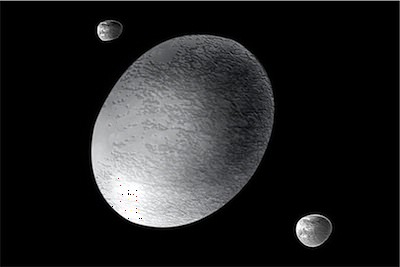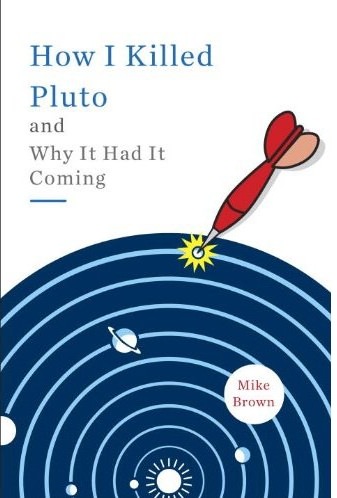[/caption]
Talk about sticking to your convictions. Astronomer Mike Brown discovered an object that, at the time, was thought to be 27% bigger than Pluto. But he really didn’t want it to be a planet — he had argued against Pluto and other objects he had discovered being planets on the basis that they are in the middle of a “swarm” of similar objects. “To me it made no sense to pull one of even a few objects out of the swarm and call them something other than part of the swarm,” he wrote in his new book, “How I Killed Pluto and Why it Had it Coming.”
Universe Today had the chance to talk with Brown about his book, his discoveries, and even the latest news that perhaps Pluto actually is the biggest dwarf planet out there that we know of. Enjoy part 1 of our Q & A with Mike Brown, with part 2 coming tomorrow.
Also read our review of “How I Killed Pluto,” and find out how you can win a copy!
Universe Today: Over the past couple of weeks, some new discoveries have come out about the size of Eris. What are your thoughts that Pluto may actually be a bit bigger than Eris?

Mike Brown: The super-cool thing there is that when we first discovered Eris, it was great. I mean, it was fascinating for everyone in the public because we thought it was bigger than Pluto. But scientifically it really didn’t add much to our understanding of the solar system. Eris was kind of just a slightly larger twin of Pluto and nothing new was going on there. That was because we assumed it was near the larger end of the ranges of uncertainty. And by assuming that, we thought Eris was on the smaller end of density, making it the same density as Pluto. When that is the case, it is just a copy. But now that we realize it is essentially the same size as Pluto, that means Eris is a good bit more dense than Pluto, and that is actually really shocking. It tells you that these two things that formed in more or less the same place in the solar system and you would have predicted to have the same composition are essentially very different in composition. I’ve been beating my head against the wall ever since those first reports that Eris was actually smaller.
UT: Your new book, “How I Killed Pluto (and why it had it coming)” is a great read – a real page turner! How long did it take you to actually write your book?
Mike Brown: It was in fits and starts. I started it before the Pluto demotion, and I started it as sort of a ‘discovery of Eris’ book and when it looked like the IAU was going to declare it a planet. And then when it wasn’t a planet and when Pluto became part of the story I restarted it as still about Eris, but also about Pluto. In the end, the sad part of it that nobody really cares about Eris, they only care about Pluto, and so it took me awhile to get back to writing it and get to the point where I could say that this was really about Pluto as well as Eris. So it was over 2-3 years in different chunks, but the final part was a 6 month push in 2009 when I sat down and wrote the whole book.
UT: At the beginning of the book, you portray yourself as sort of stumbling into the field of looking for large objects in the Kuiper Belt. And yet here you are…
Mike Brown: I don’t know if there is any way to know ahead of time how your life is going to work out. Most people don’t have a grand plan they follow and have it work out. You start working on something and sometimes these things work out spectacularly; sometimes it works out OK, and nobody hears about it and sometimes things just don’t work out.
You see people who have done big amazing things, and you wonder how they got from here to there. Usually there is drive to do something, but everybody has to have some luck. They have to have drive and ability, as nobody does it on just luck, though. But there was no requirement that there were these large things out there in the outer solar system, and then the story would have been, “wow, what an idiot. This guy spent two years doing something and nothing came of it.” I had no way of knowing ahead of time which was going to be the answer. I’m lucky, and happy that it turned out the way it did.

UT: There was a dispute about the discovery of Haumea, where either it was an incredible coincidence that other astronomers may have found the object, too, or they may have stolen your data. In your book you say that you’re fine with not really knowing what happened – which to me is incredibly noble of you (and I think you were very noble about the whole episode). Why don’t you want to know?
Mike Brown: I don’t mean to say I don’t want to know; I would love to know. If you knew the answer and I knew I could ply you with whisky until you told me, I would go out and buy as much whisky as I could. I would love to know the answer. I don’t think I ever will, and so I’m maybe resigned to that. In my gut, I feel like I know what happened, but I really don’t. I could be wrong and then every once in a while I have doubts and say maybe these guys really didn’t do anything wrong and they had their lives ruined. It is very frustrating. I really would like to know the answer because somebody in this story is a bad person, and I hope it is not me. But, god, what if it is?
UT: You certainly gave them the opportunity to tell their side of the story and I don’t know if they really have.
Mike Brown: No, they haven’t. And it is easy to take that interpretation, and if you watch enough “Law and Order” you know that people who hide what is going on are always guilty. But at the same time I try to put myself in their shoes, where they didn’t know what they were about to stumble into, and to suddenly be barraged by the media — to which they weren’t accustomed — and not knowing what to do about it, I can imagine that they wouldn’t tell their side of the story. If everything had been on the up and up, they may have behaved the same way. Deep down inside, I don’t think so, but I don’t have certainty. And I would love to have it. Someday, somewhere, someone may walk into my office and close the door and say, “OK, I know what happened and let me tell you.’ I relish that day, but I don’t know that it will ever happen.
UT: Well, again, I thought you were very nice about the whole episode.
Mike Brown: Before writing the book, I went back and looked at all the emails back and forth about this. The crazy part for me was that my daughter was 20 days old, and these guys had just potentially done something horrible. But when I started writing about it for the book, I didn’t really remember much of it because don’t think anyone remembers much from when their children are 20 days old. I could really only reconstruct it from my own emails with them. And looking back, I am kind of proud of myself. I was really very nice. I was very supportive. I made a big website proclaiming their discovery and pointing everything to them. So, wow, on lack of sleep I’m a relatively nice guy.
Perhaps it helps having a little infant that you are carrying around for perspective as far as what is important and what isn’t. As trite and cliché-ish as that is, I think it is actually true.
UT: But yet, you seem to relish the role of “Pluto Killer”…
Check back tomorrow to find out Mike Brown answers this question, and more!


Once again, Brown is being extremely disingenuous by repeating the false statement that only a few vocal astronomers still oppose the demotion of Pluto. This is absolutely NOT TRUE, and it is unprofessional for him to mislead the public this way. A total of 424 IAU members out of 10,000 voted on this, most of whom are not planetary scientists, and an equal number of professional astronomers, led by New Horizons Principal Investigator Dr. Alan Stern, signed a formal petition rejecting the IAU decision. Brown did not “kill” Pluto in spite of his obsession with claiming to have done so. Even Dr. Neil de Grasse Tyson admits the debate is ongoing. I encourage people to learn both sides of the issue. Some good pro-Pluto as a planet books are “Is Pluto A Planet?” by Dr. David Weintraub, “The Case for Pluto” by Alan Boyle. Objects in the Kuiper Belt that are large enough to be rounded by their own gravity are BOTH planets and Kuiper Belt Objects. One does not preclude the other.
I have a book of my own coming out soon, “The Little Planet that Would Not Die: Pluto’s Story.”
For the life of me I can’t understand the argument why it should be a planet. Except maybe that of being grand-fathered in.
It clearly is of the same class as the the other KBOs (perhaps largest, but even if it is, then just barely) and of a different class than Neptune and the other planets there.
So if Pluto’s a planet, than all the KBOs are.
Personally, I don’t give a hoot what the IAU, Mr. Brown or Dr. Neil de Grasse Tyson say…Pluto IS a planet to me and always will be. I am glad that the IAU has finally defined what a planet is, but Pluto was considered a planet for decades before they did. It SHOULD be grandfathered in as a planet and Dr. Tyson and Mr. Brown should understand why Pluto should be considered a planet even if it does not meet thee new definition.
We needed a good definition of a planet and now we finally have one, but leave Pluto alone, and even though it originated in the Kuiper belt, is any part of it’s orbit currently IN the standard definition of the belt?
Laurel —
I don’t know if you read Neil Tyson’s book on Pluto but he does a pretty good job demolishing your numerics. I’d recommend checking it out.
I see you post this same stale argument every time “Mike Brown” is mentioned anywhere on the internet. I then, a few days later, the rebuttal to Mike Brown is always from Alan Stern (wait for it, wait for it…..) who, as director of the mission to Pluto, has much personally at stake. Those other 9776 IAU astronomers, who you assume MUST be on your side, are oddly silent. Seems like Mike Brown’s assessment of the level of interest in this topic amongst real astronomers is probably about right. The public might indeed still care, and a few enthusiastic activists will likely never give up the fight, but I believe the statement that scientists have moved on to do more important things. Like science, for example.
Mike Brown could be related to Bill Gates. He looks like a younger brother maybe.
I eagerly await my opportunity to read this book. I can say I have lived through a revolution in planetary science with regard to the status of Pluto. But in the end it is better considered an evolution of planetary science. The dicovery of exoplanets also highlighted a dire need to redefine what a planet is. Even as a teen, the notion of Pluto as a planet never qute sat well with me. One major factor is it’s small size, smaller than many moons. Then there is it’s eccentric orbit which was clearly a result of it being tossed around by Neptune, a real planet. I agree that Pluto deserved to be demoted from it’s lofty full planet status. All along I secretly interpreted it’s elevation to a planet as more a stroking of the ego of the person who found the object. It should have been demoted much sooner, once it’s true characteristics in relation to the other planets were understood. I think it is admirable of Prof. Brown to show such humility with regards to his discovery.
That said, I do take issue with IAU’s definition of why it is not a planet. I don’t agree that an object’s ability to clear it’s orbit is going to stand the test of time, and here is why:
If an Earth or Mars sized object were discoverd in a very distant orbit, something that is actually quite possible one day, it would still fail to be classified as a planet based on this defintion. What I would propose then is that there should be a limit on size when classifiying an object as a planet. Below a certain diameter an object should be classified a dwarf given the current definition, but above the upper limit it automatically gains planet status.
Considering that the term “dwarf” is used to classify such objects as the definition currently stands, it would be quite amusing if a Neptune sized object were found orbiting eccentricaly at 5000 AU, (again something that has a relatively high chance of happening in the distant future) and it were called a dwarf based on the current definition. There is a smaller chance that a Jupiter sized object may be orbiting at a very distant orbit, say 50000 AU and it too would have to be classified as a dwarf using the current criteria since it would not have had a chance to “clear” it’s orbit. Believe it or not, finding a very distant Jupiter sized object would more likely happen first since such objects should release internal heat and be detectable with very sensitive infra-red instruments. Perhaps another category could then be added for oort cloud objects such as “thrown out to distant orbit planet” or “captured planet from the stellar nursery” to describe these objects.
I personally prefer TNOs to describe Pluto, Eris and similar bodies, but then there is the issue of Sedna and Ceres.Vesta may also be a problematic object if it found to be a round object with a big dent near the south pole as is expected. It is actually larger than Ceres. This may challenge the IAU to rethink the exclusion criteria of roudness for a dwarf planet.
So in conclusion, I don’t think the IAU’s work is done with regards to defining planets. But I agree with professor Brown that demoting Pluto and classifying it with other similar objects is a good conceptual start.
With regards to the Humea incident, it seems to me intuitively obvious, even to the most casual observer, what happened. Hacking goes on all of the time, and is a worsening and growing threat to the wonderful invention of the internet. Sadly to say about half of the citizens on this planet are capable of putting aside their conscience (assuming that they ever had one) and doing horrendous things. There is an old saying that hell hath need of souls. This applies to people at all levels of society, including scientists in academia. For example, falsifying data to get null studies published in journals is a fairly common problem that will never disappear so long as human beings are doing the research.